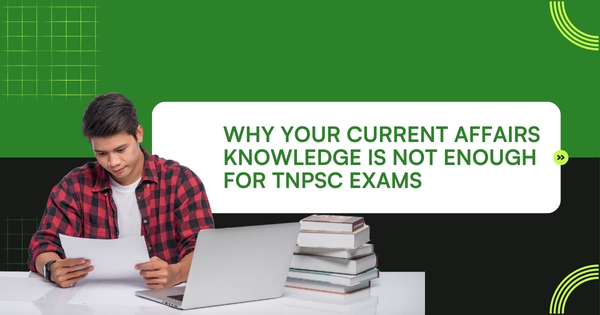When aspirants think of the TNPSC exams, most immediately dive into TNPSC Current Affairs preparation. It makes sense current affairs cover everything from politics to economics, science, culture, and global events. However, here’s the harsh truth: relying only on current affairs knowledge will not secure your seat in the TNPSC Mains exam or even in prelims.
The exam is structured to test not just what you know today but also how well you can connect it with static concepts from the TNPSC syllabus. Without an integrated approach, you risk falling into common TNPSC study mistakes, wasting precious time, and missing out on your dream government job.
At this stage, many aspirants realise the value of structured guidance whether through self-designed plans or reliable TNPSC coaching that helps connect static subjects with current affairs.
This article explores why current affairs alone aren’t enough, the importance of a strong TNPSC exam preparation strategy, and practical success tips to master both static and dynamic subjects.
Why Current Affairs Alone Won’t Help in TNPSC
1. TNPSC Exams Are More Than Daily News
- Prelims and mains demand both factual awareness and conceptual clarity.
- For example, a current event about inflation isn’t enough—you must also know the economic theories behind it.
2. Static Subjects Form the Backbone
- History, Polity, Geography, and Science dominate the TNPSC syllabus.
- Current affairs questions often derive their relevance from these static subjects.
3. TNPSC Mains Exam Requires Depth
- Mains questions are analytical, not just factual.
- You must learn to link current affairs with static subjects to answer effectively.
4. The Trap of Memorization
- Many candidates memorize headlines and monthly magazines without analysis.
- This is one of the biggest TNPSC study mistakes that leads to failure.
How to Integrate TNPSC Current Affairs with Static Subjects
1. Start with the TNPSC Syllabus First
- Go through the official TNPSC syllabus and identify where current affairs can be applied.
- Example: Environmental issues in news → Link with Environment & Ecology from General Studies.
2. Use Current Affairs as Case Studies
- Instead of treating them separately, use them as examples in answers.
- For instance, when writing about federalism, cite a recent dispute between the state and central government.
3. Make Short Notes
- Divide notes into categories: Polity, Economy, Science, Environment, International Relations, etc.
- Keep them concise for revision before prelims and mains.
4. Regularly Revise
- Current affairs lose value if you don’t revise.
- Follow the TNPSC exam preparation strategy of “Read – Revise – Recall.”
- A storytelling paragraph on how overloading with PDFs made one aspirant fail, while another succeeded with focused study. This builds authority.

Biggest TNPSC Study Mistakes with Current Affairs
Treating TNPSC coaching notes as final material instead of using them as a base for deeper understanding.
- Ignoring the basics – Jumping straight to monthly current affairs PDFs without understanding core concepts.
- Depending on one source – Limiting yourself to one magazine instead of multiple sources like newspapers, PIB, and gov.in updates.
- Not making connections – Treating current affairs as isolated facts instead of linking them to static subjects.
- Skipping revision – Reading without revising leads to low recall during the exam.
- Overloading information – Trying to remember every event instead of focusing on relevant issues.
Proven TNPSC Success Tips for Current Affairs
- Follow standard sources: The Hindu, Indian Express, PIB, and Tamil Nadu Government websites.
- Use online platforms: TNPSC portals and YouTube channels for analysis.
- Practice writing answers: Especially for the TNPSC mains exam where expression matters.
- Set time limits: Use smart TNPSC time management by allotting 1–2 hours daily to current affairs.
- Attempt test series: Helps in evaluating how well you link concepts.
TNPSC Exam Preparation Strategy for Current Affairs
Step 1: Daily Reading
Spend at least 1 hour reading newspapers and note key points.
Step 2: Weekly Compilation
Summarize events weekly instead of trying to revise every single day.
Step 3: Monthly Revision
Use monthly current affairs magazines as a revision tool, not as your primary source.
Step 4: Answer Writing Practice
Frame answers linking TNPSC current affairs with the TNPSC syllabus.
Step 5: Mock Tests
Take at least 2–3 mock tests weekly to evaluate your retention.
Linking Current Affairs with Static Subjects: Examples
- Economy: Budget 2024 → Link with concepts like fiscal policy.
- Environment: Climate summits → Link with environmental policies in TNPSC syllabus.
- Polity: Supreme Court judgments → Link with constitutional articles.
- Geography: Floods and droughts → Link with monsoon patterns.
FAQs on TNPSC Current Affairs
1. How important is TNPSC Current Affairs for clearing prelims?
Very important, but it must be studied with static subjects for context.
2. Can I clear the TNPSC exam by studying only current affairs?
No. That’s one of the biggest TNPSC study mistakes—you need both static and dynamic knowledge.
3. How to link current affairs with static subjects?
Use them as examples to explain historical, political, and economic concepts.
4. What is the best TNPSC exam preparation strategy for current affairs?
Daily reading, note-making, monthly revision, and answer-writing practice.
5. Which sources should I follow for TNPSC Current Affairs?
The Hindu, PIB, Yojana magazine, and TN government websites.
Learn More >>> https://blog.impacteers.com
About Us >>> https://www.impacteers.com




Post Comment